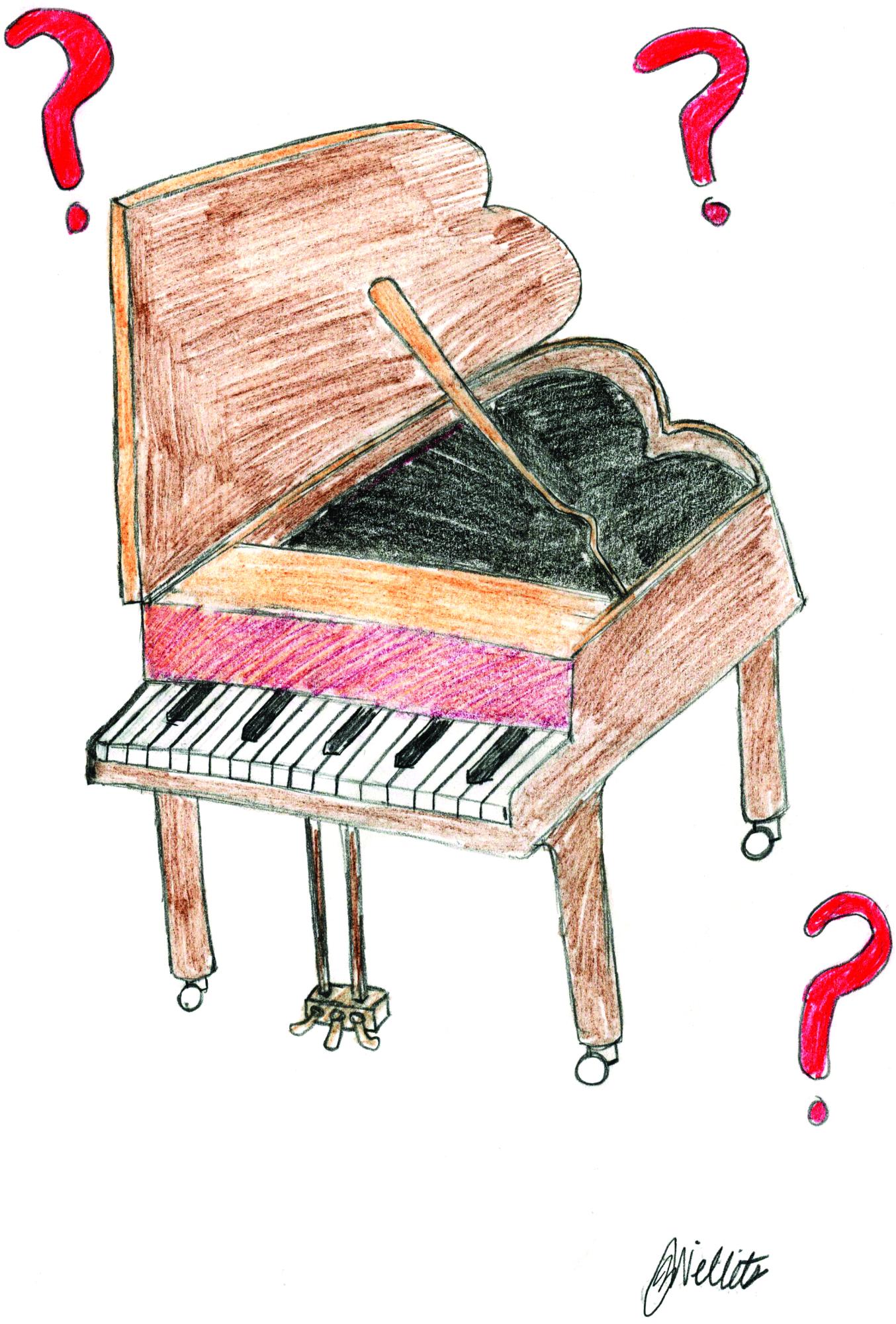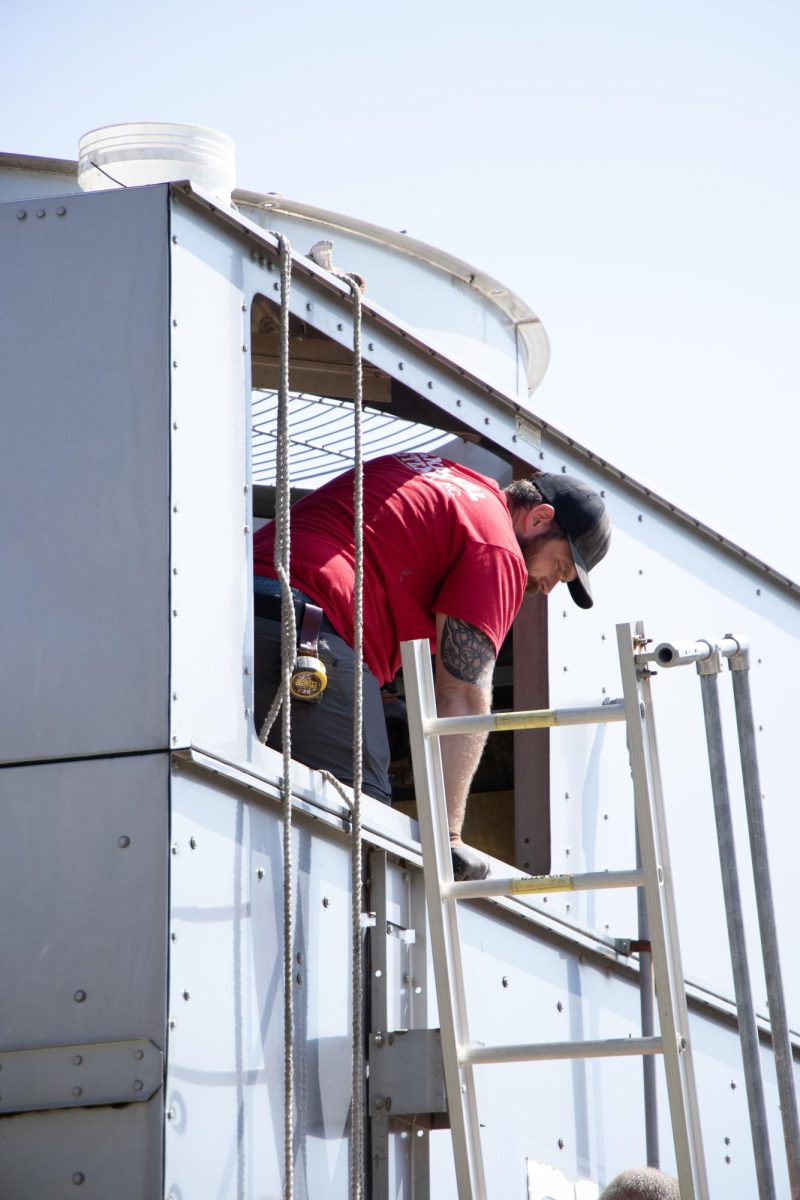In May of 2023, Millard South and North were the only Millard high schools with a permanent, 5 days a week accompanist. Going into the 2023-2024 school year, Millard South now joins Millard West in the search for an accompanist leaving only one out of the three high schools with a pianist.
“Having an accompanist is 100 percent a vital part of a choir operating at a high caliber,” choir director Jason Stevens explained.
“It’s not just the music that suffers when we don’t have an accompanist. It’s also the fact that there is only one teacher with 80 students in a classroom that has to not only try to teach the music but also play the notes for different voice parts. It’s especially hard, when that is not our forte or what we studied,” additional choir director Ms. Sweets tagged on.
Today, rather than the directors beginning class on a podium, both now have no choice but to either pull out their laptop to electronically play voice parts or sit behind the piano.
The hunt for a replacement began right as the school year ended in May. Luckily, Stevens and Sweets knew that Ms. Wetkin, the former South accompanist, was resigning from the position.
According to Stevens, there are two big issues that turns possible applicants away from the accompanist position: pay and hours.
“The position actually is only like 30 hours a week. So, it’s not a full time position. The other thing is, while we have done a significant pay raise, we are still not competitive compared to other districts in the area. I believe the job is posted starting at $17.65 an hour, but OPS schools are paying $20.99 an hour. Other districts are paying even more than that,” he said.
Contrary to what it may seem, Stevens and Sweets believe that the Millard district is supportive of the choir program. To the directors, it is just about educating high-end administrators about why raising the pay is so important.
“One of the things that we keep trying to advocate for is that there are three accompanist positions in the district. And those three positions have a huge effect on a large number of students. Last year, at the district music contest, the only schools that walked away with the top rating were the three Millard high schools’ varsity choirs. So, all Millard high school choir programs are operating at a high caliber. It is just about getting the district to understand how important those three positions are to the success of the program,” Stevens said.
To Sweets, the music that would be played by an accompanist is not the only thing that suffers with no one to fill the position.
“It’s also the fact that one teacher with 80 students in a classroom has to not only try to teach the music and play the notes of the different voice parts when that is not our forte or what we studied in college. But then we also have to think about classroom management of 80 students in a large classroom in addition to student engagement. So, not having anyone in the accompanist position makes a really large impact on how the class functions.”
Stevens has also found a similar difficulty in his bass and tenor class for freshman boys, Macho Voce.
“I do think that to a certain extent, that not having someone to play the piano has hurt students. There have already been times this year where I have been sitting down playing something and I hear young basses that have probably just gone through their voice change, and they’re not matching pitch. And if we had an accompanist, then I would be over there by them singing in their ear whereas now I’m sort of stuck at the piano.”
Even without a piano man, Stevens and Sweets have confidence that the choir program will remain strong with only a few consequences.
“Our choir students understand what’s going on and know that we will have to work around the lack of the positon being filled. We know that students will be picking up the slack because they sort of refuse to not have a great experience. But that’s probably not going to last forever, and it’s not really their responsibility anyhow. I think there might be some long term problems,” expressed Stevens.
On the other hand, Sweets found that it had been more challenging to make connections with the students in her classroom.
“Especially with our freshmen and students new to the program, I have felt unable to bond with my students. Like Stevens mentioned, it’s hard when you’re stuck behind a piano. I can’t see past the second row out of four rows of students. I’m just not up and moving around the classroom like I could with an accompanist last year. I really feel like individual student relationships with us directors are suffering.”
Despite the negative situation, Sweets found a positive.
“When we can’t play multiple parts at a time, students will be singing by themselves without help. Sight reading skills should improve from this.”
In addition to having to sight read, all choir students now have to utilize online help with part tracks.
“We’re going to try to use a lot of technology and we’re going to try to put some of the work back on the students to help them build skills. It’s a really easy crutch to only use the accompanist when in reality we’re capable of doing more of the work on our own,” Stevens explained.
“We’re also looking at doing a lot more acapella music just to work on some of that as well. It’s just not ideal for the students.”
Even though students are able to learn the music on their own with the assistance of their directors, there is no other choice but to have an accompanist in the case of a choir concert.
“Mrs. Wetkin has graciously offered to help out if we really get in a bind and can’t find a replacement. She would come in for a rehearsal or two before a concert and then we would pay her to just play the concerts. It’s definitely not ideal but that is where we are at,” stated Stevens.
The duo had been working together to increase the salary of accompanists in Millard Public Schools for a while, but had thus far had little luck. However, with all three Millard high schools looking for an accompanist this past summer, the district realized something needed to be done for the position in all schools to be more desirable.
“Raising the salary became even more important once all three high schools didn’t have an accompanist,” Stevens stated.
“So, we worked hard by talking to the district admin and anyone who would listen to get the pay raised, which it did. There are also some additional benefits that are included with it, which were not there before. So we’ve made some really, really, really big progress.”
Recently, three candidates applied to the position. Sweets and Stevens were willing to give one of them the job but ultimately the person decided to go a different direction. Today, the directors are at square one but still making efforts to make the open position known.
“We did a lot of work of getting the info out on social media, calling lots of people making sure everyone was aware the job was open, and then waiting for applications to come in. I think at this point in order to get an accompanist, we’re going to have to be more than competitive. I really think we will have to get someone to jump ship from a different school, which is a horrible thing to do. But at this point, what we’re going to have to do is steal an accompanist from a different school. Like I said, we’re going to have to be more than competitive to get them to do that, though,” Stevens explained.
As of Sept. 15, there have been no applications submitted. Sweets and Stevens plan to just keep putting information out to the public about the job in hopes of finding an accomplished accompanist for the Millard South choir program.
“The more people who can think about good pianists they know and encourage them to apply, the better off we’ll be.”














